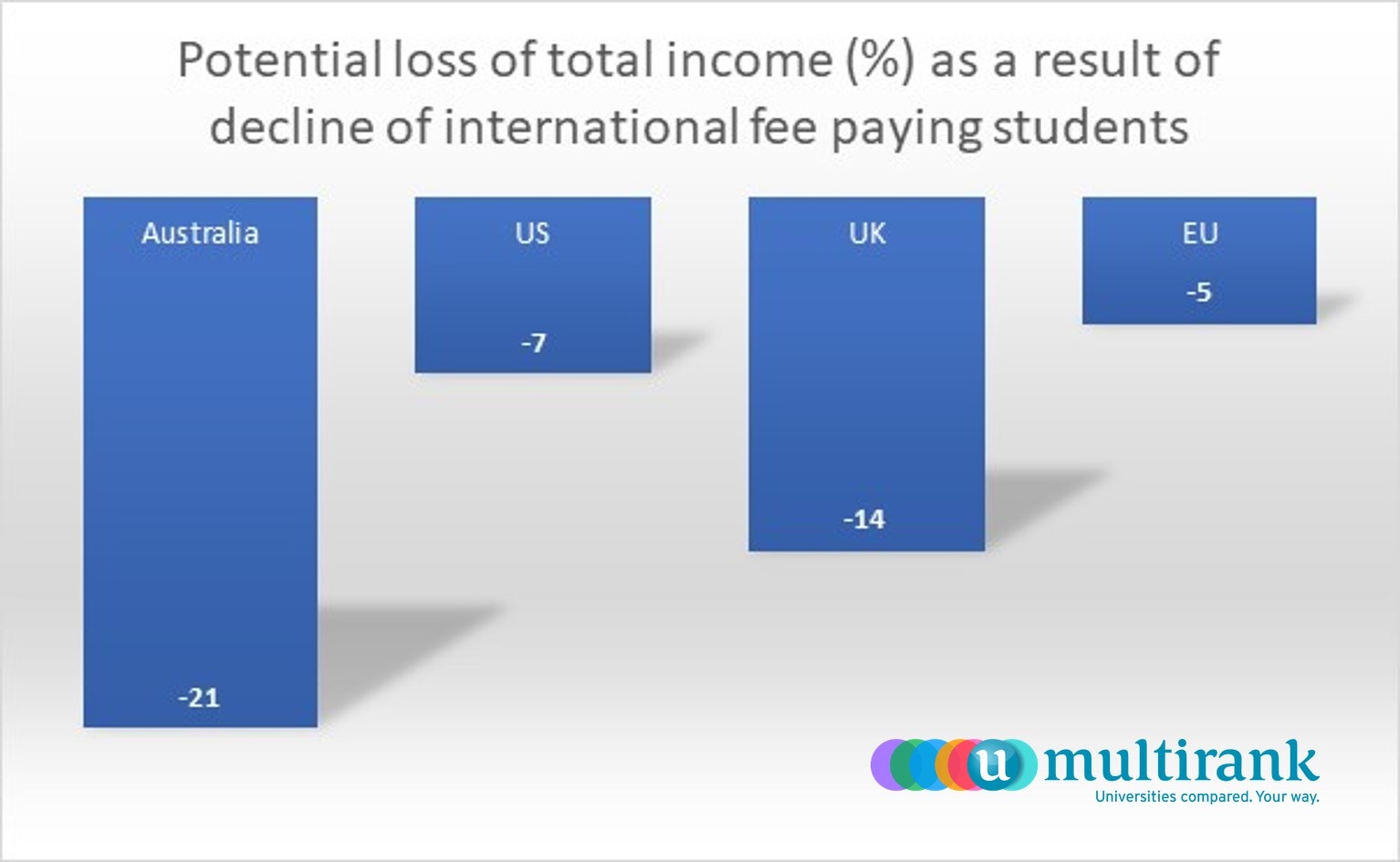Universities in Australia and UK more afflicted by COVID-19 crisis than EU and US universities
CONTACT: John Roman, email media@umultirank.org, phone +49 (0) 5241 9761 58
Based on an analysis of its database, U-Multirank concludes that universities in Australia and the UK may be financially hurt most by the COVID-19 crisis. Particularly because of a decline of the number of international fee-paying students, the potential decrease of income as percentage of the total institutional budget for Australian universities is on average 20.8%; for UK institutions 14%; for the US universities nearly 7%, while for EU institutions only 5.2%.

Several earlier publications have indicated that a negative financial effect has to be expected for higher education institutions worldwide. U-Multirank now provides the data to quantify the possible negative impact caused by the loss of international students.
Frans van Vught, co-project leader of U-Multirank, said that ‘the COVID-19 crisis appears to have a dramatic effect on the mobility patterns of international fee-paying students. They now hesitate to apply for enrollment in universities in other countries, postpone their decisions to do so, or chose an institution ‘closer to home’. As a result, particularly in countries where there are government and institutional policies to recruit heavily from the international student market like in Australia and the UK, the universities are confronted with a strong negative impact.’
Frank Ziegele, U-Multirank’s other project leader said: ‘EU universities seem to be financially safe now; they are often strongly subsidized from the public purse and less dependent of high international tuition fees, but a problem may arise when governments start decreasing their higher education funding as a consequence of budgetary constraints caused by the pandemic.’
The European University Association (EUA) recently warned that public funding in Europe for higher education may go down, because of a decrease of fee income from both national and international students. EUA suggested that, because of their high tuition fees, the UK and Ireland are seriously at risk. U-Multirank shows that the dependence of fee income (including international fee income) is relatively high in the UK (54%), Latvia (38%), Ireland (35%) and Bulgaria (35%).
U-Multirank also shows that research universities may be financially hurt more by the COVID-19 crisis than teaching focused institutions risk. Compared to teaching institutions, research universities attract larger numbers of international students. Particularly the research universities with a strong research reputation are highly attractive to graduate students from abroad who are often willing to pay high tuition fees.
Nevertheless, a strong international focus of universities is not necessarily linked with a high financial vulnerability. In U-Multirank’s Readymade Ranking on International Orientation for 7 of the top 15 institutions the fee income is more than 40% of the total institutional income, but while some depend heavily on the contributions from international fee-paying students (Grenoble Ecole de Management: 30.8%), for other institutions this is less the case (Audencia Business School: 9.4%)
U-Multirank furthermore allows a comparison between public and private universities. Private universities (particularly international business schools) depend more on tuition fees than public universities (40-80% compared to 7-30% of their income), some of them to a large degree on fees paid by international students. As a percentage of the total institutional budget – particularly in the US – the international fee income from private universities is more than twice as high when compared to public universities.
Ends
Notes for editors
Since 2018 U-Multirank collects data at the subject level on various aspects of the digitalisation of degree programmes. This includes information on the availability of a fully on-line option within degree programmes; the percentage of digital teaching formats in degree programmes; and student assessments of different aspects of digital teaching and learning.
For journalists and all users alike, U-Multirank offers tailor-made rankings and story analyses, for example country reports focusing on university performance in a specific country, or its global ‘Top 25 Performers’ lists in areas like university-industry relations, or the most international universities.
Since its first publication in 2014, U-Multirank has more than doubled the number of universities (higher education institutions) from 850 to nearly 1,800 and increased the coverage of countries from 74 to 92, including more than 5,300 faculties and more than 11,800 study programmes across 28 subject areas.
U-Multirank is an alternative approach to comparing universities and offers a solution to the flaws of traditional league tables. Its multi-dimensional approach compares the performance of universities across a range of different activities grading each of them from ‘A’ (very good) to ‘E’ (weak). It allows users to identify a university’s strengths and weaknesses, on the aspects that most interest them. The data included in U-Multirank are drawn from a number of sources, providing users with a comprehensive set of information: data supplied by institutions; and drawn from international bibliometric and patent databases; from national databases; and from surveys of more than 100,000 students at participating universities.
U-Multirank originated at a conference of the European Commission during the French presidency in 2008. Since 2017 it is funded by the Bertelsmann Foundation, the European Union's Erasmus+ Programme and Santander Group. U-Multirank is developed and implemented by an independent consortium led by the Centre for Higher Education (CHE) in Germany. The Center for Higher Education Policy Studies (CHEPS) at the University of Twente and the Centre for Science and Technology Studies (CWTS) from Leiden University, both in the Netherlands, as well as Fundación Conocimiento y Desarrollo (FCYD) in Spain are partners in the project. The consortium is headed by professors Frans van Vught (CHEPS) and Frank Ziegele (CHE).
Appendix
- Bar graph showing potential loss of income (%) due to decline in international fee-paying students
- Infographic on financial impact of COVID-19 on universities
- Video on financial impact of COVID-19 on universities





